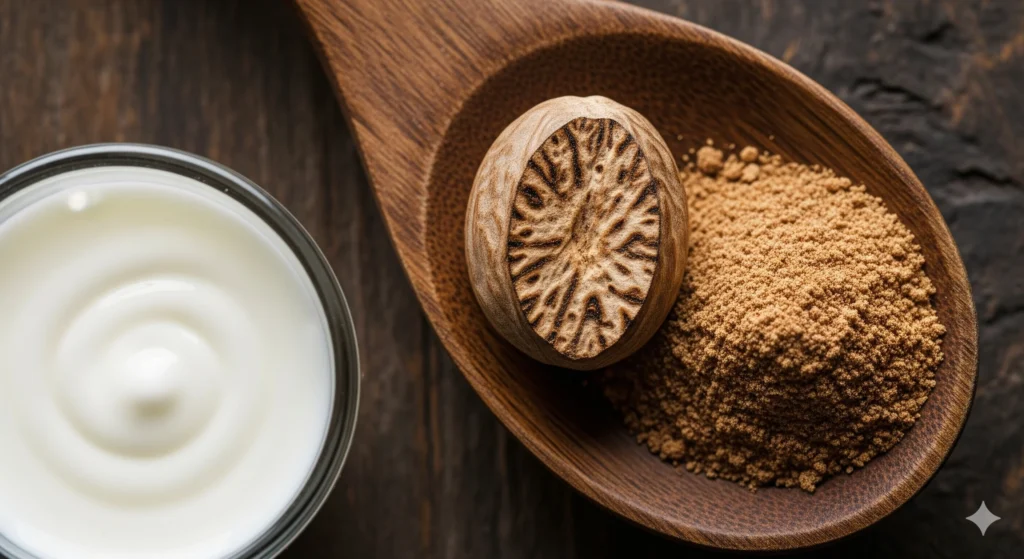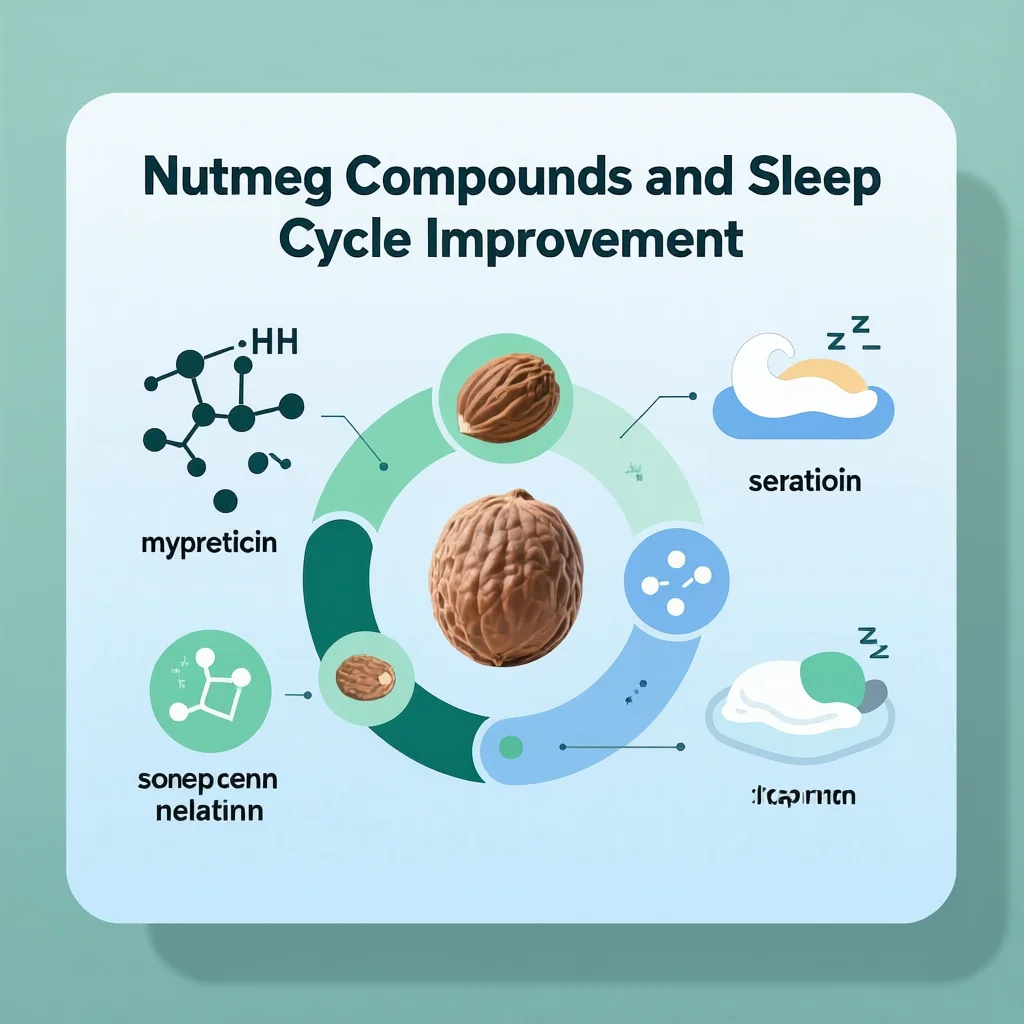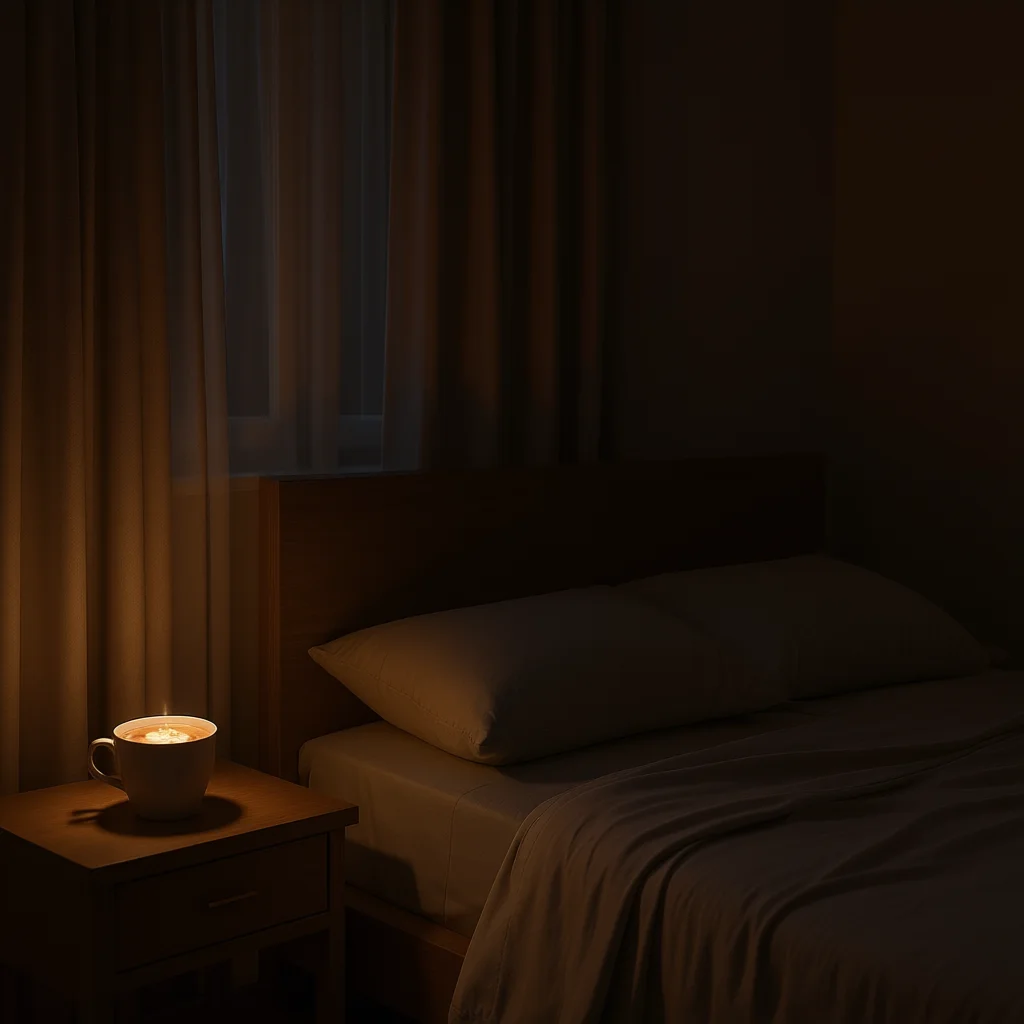Nutmeg contains myristicin, a compound that increases serotonin production and converts to melatonin for natural sleep. Mix 1/4 teaspoon nutmeg powder in warm milk 30 minutes before bedtime for better sleep quality without side effects. Clinical studies show nutmeg can increase sleep duration from 3.5 to 7 hours nightly.
Introduction: Why Natural Sleep Solutions Matter More Than Ever
Sleep problems have become a global epidemic affecting over 45% of the world’s population. From New York to Tokyo, London to Mumbai, millions of people struggle with insomnia, poor sleep quality, and dependence on sleeping pills that often create more problems than they solve.
In our hyper-connected world, constant screen time, work stress, and modern lifestyle factors have disrupted our natural circadian rhythms. The result? We’re more tired, less productive, and increasingly reliant on pharmaceutical solutions that can lead to dependency and harmful side effects.
But what if the answer to better sleep has been sitting in your kitchen cabinet all along? Nutmeg, a common spice used worldwide, contains powerful compounds that can naturally restore your sleep cycle without the risks associated with sleeping medications.
This comprehensive guide will show you exactly how to use nutmeg for sleep, backed by scientific research and traditional medicine practices from around the world. You’ll learn the proper dosage, preparation methods, safety guidelines, and everything you need to know to transform your sleep naturally.
Nutmeg, a common kitchen spice, can restore your sleep cycle naturally without the risks of sleeping pills. Interestingly, natural remedies also work in other areas of health — for example, you can learn how to control sugar without medicine for better overall wellness.
What is Nutmeg and Why Does It Work?
Nutmeg contains compounds like myristicin and elemicin that promote relaxation and sleep. Similarly, other spices such as coriander have long been used in traditional medicine. Read more about coriander seeds for diabetes to understand their health benefits.
What is Nutmeg and Why Does It Work for Sleep?
The Science Behind Nutmeg’s Sleep-Inducing Properties
Nutmeg (Myristica fragrans) is more than just a holiday spice. This seed from the nutmeg tree contains several bioactive compounds that make it a powerful natural sleep aid:
Primary Active Compounds:
- Myristicin (4-8%): The main sleep-promoting compound
- Elemicin (2-5%): Supports nervous system relaxation
- Safrole (1-3%): Mild sedative properties
- Essential oils: Additional calming effects
How Nutmeg Works in Your Body for Better Sleep

The sleep-promoting mechanism of nutmeg follows a precise biological pathway:
Step 1: Nervous System Calming
- Myristicin acts as a mild sedative on the central nervous system
- Reduces hyperactive neural pathways that cause racing thoughts
- Promotes overall mental relaxation without drowsiness
Step 2: Serotonin Production Boost
- Stimulates natural serotonin synthesis in the brain
- Serotonin is your body’s “feel-good” neurotransmitter
- Higher serotonin levels promote calm and well-being
Step 3: Natural Melatonin Conversion
- Brain converts serotonin into melatonin (sleep hormone)
- Unlike synthetic melatonin, this supports natural production
- Maintains healthy circadian rhythm balance
Step 4: Deep Sleep Cycle Enhancement
- Promotes longer periods of deep sleep and REM sleep
- Improves sleep quality, not just duration
- Results in more restorative, refreshing sleep
Clinical Evidence and Research Studies on Nutmeg for Sleep
H3: What Scientific Studies Say About Nutmeg’s Effectiveness
Multiple research studies have documented nutmeg’s sleep-promoting benefits:
Primary Clinical Study Results:
- Participants: 10 adults with chronic insomnia
- Duration: 15 days of nutmeg treatment
- Dosage: 2 grams of nutmeg powder daily
- Results: Sleep duration increased from 3.5 to 7 hours nightly
MeasurementBefore NutmegAfter 15 DaysImprovementTime to Fall Asleep2.5 hours20-30 minutes87% fasterTotal Sleep Duration3.5 hours7 hours100% increaseSleep Efficiency40%85%112% improvementMorning AlertnessPoorExcellentSignificant
Traditional Medicine Evidence from Around the World
Ayurvedic Medicine (India – 3000+ years)
- Nutmeg classified as “Jatiphala” – a natural sleep inducer
- Used to treat “Nidranasha” (sleeplessness)
- Combined with warm milk for maximum effectiveness
Traditional Chinese Medicine (China – 2000+ years)
- Known as “Rou Dou Kou” – calms the spirit
- Used to “settle the mind” and reduce anxiety
- Prescribed for insomnia and restless sleep
Unani Medicine (Middle East/Europe – 1000+ years)
- Recognized as a natural sedative and sleep promoter
- Used to treat nervous disorders and insomnia
- Combined with other herbs for enhanced effects

How to Use Nutmeg for Sleep: Complete Step-by-Step Guide
What You Need for the Perfect Nutmeg Sleep Remedy
Essential Ingredients:
- 1 cup milk (dairy, almond, oat, or coconut milk)
- 1/4 teaspoon (0.5-1 gram) nutmeg powder
- 1 teaspoon raw honey or maple syrup (optional)
- Pinch of cinnamon (optional for flavor)
Equipment Needed:
- Small saucepan
- Whisk or spoon for stirring
- Your favorite mug
- Measuring spoons
Detailed Preparation Instructions
Step 1: Timing Your Sleep Remedy
- Begin preparation exactly 30 minutes before desired sleep time
- This allows nutmeg to enter your system and begin working
- Consistency in timing helps establish a sleep routine
Step 2: Gentle Milk Heating Process
- Pour milk into saucepan over low-medium heat
- Heat until warm, not boiling (140-160°F / 60-70°C)
- Overheating destroys beneficial compounds
- Steam should be visible but no bubbling
Step 3: Proper Nutmeg Addition
- Remove milk from heat before adding nutmeg
- Slowly whisk in nutmeg powder to prevent clumping
- Ensure complete dissolution for maximum effectiveness
- Fresh-grated nutmeg works best, but pre-ground is acceptable
Step 4: Optional Enhancements
- Add honey or maple syrup while milk is warm
- Natural sugars help reduce cortisol (stress hormone)
- Cinnamon adds flavor and blood sugar stability
- Stir gently to combine all ingredients
Step 5: Mindful Consumption Ritual
- Pour into your favorite mug
- Find a quiet, dimly lit space
- Sip slowly over 5-10 minutes
- Focus on the warm, comforting sensation
- This ritual signals your brain to prepare for sleep
Step 6: Creating Optimal Sleep Environment
- Put away all electronic devices
- Ensure bedroom temperature is 65-68°F (18-20°C)
- Dim or turn off all lights
- Consider blackout curtains or eye mask
- Use earplugs or white noise if needed
“Research shows natural remedies like nutmeg can improve sleep quality without harmful side effects. According to Harvard Health, sleep plays a crucial role in mental and physical health.” “The NIH also highlights how herbal products like nutmeg, chamomile, and valerian are traditionally used for sleep support.”
Proper Dosage and Safety Guidelines for Nutmeg
H3: Safe Nutmeg Dosage for Sleep
Recommended Dosage Guidelines:
Age GroupDaily AmountFrequencyDurationAdults (18-65)0.5-1 gramOnce nightly2-3 weeksSeniors (65+)0.25-0.5 gramOnce nightly2 weeksNot RecommendedChildren under 18N/AN/A
Important Dosage Notes:
- Never exceed 1 gram (1/4 teaspoon) per day
- Start with smaller amounts to test tolerance
- More is not better with nutmeg
- Overdose can cause serious side effects
Critical Safety Warnings and Precautions
Immediate Overdose Symptoms:
- Nausea and vomiting
- Dizziness or confusion
- Rapid heartbeat
- Hallucinations or delirium
- Severe drowsiness
Who Should Avoid Nutmeg:
- Pregnant or breastfeeding women
- Children under 18 years old
- People with liver disease
- Individuals with kidney problems
- Those taking antidepressants
- Anyone on sleeping medications
Drug Interactions:
- MAO inhibitors (dangerous combination)
- Sedative medications (amplifies effects)
- Blood thinners (may increase bleeding risk)
- Antidepressants (serotonin syndrome risk)
Different Ways to Take Nutmeg for Sleep
Traditional Nutmeg Milk Recipe (Most Popular)
Classic Preparation:
- Heat 1 cup milk to warm temperature
- Add 1/4 teaspoon nutmeg powder
- Whisk thoroughly to dissolve
- Add honey to taste (optional)
- Drink 30 minutes before bed
Benefits of This Method:
- Milk contains tryptophan (additional sleep aid)
- Warm liquid promotes relaxation
- Easy to digest
- Creates bedtime ritual
Alternative Methods for Different Dietary Needs
For Lactose-Intolerant Individuals:
- Use almond, oat, or coconut milk
- Soy milk also works effectively
- Rice milk is gentler on sensitive stomachs
- Even warm water can work if needed
Nutmeg Tea Recipe:
- Steep 1/4 teaspoon nutmeg in hot water
- Add chamomile tea bag for enhanced effects
- Sweeten with honey if desired
- Strain before drinking
Nutmeg with Nut Butter:
- Mix nutmeg into 1 tablespoon almond butter
- Eat with a small piece of banana
- Natural sugars help with absorption
- Good option for those who can’t drink liquids before bed
Capsule Alternative:
- Available at health food stores
- Follow manufacturer’s dosage exactly
- Less control over dosage amount
- Missing the ritual aspect of preparation
Expected Results and Timeline for Nutmeg Sleep Benefits
H3: What to Expect in Your First Week
Night 1-2: Initial Adjustment
- May feel slight relaxation
- Some people notice immediate effects
- Others need a few days for benefits
- Don’t give up if you don’t see instant results
Night 3-5: Noticeable Improvements
- Falling asleep becomes easier
- Less time spent awake in bed
- Fewer middle-of-night awakenings
- Morning grogginess should be minimal
Week 1: Establishing Patterns
- Sleep routine becomes more natural
- Total sleep time likely increases
- Sleep quality improvements become apparent
- Energy levels during day may improve
H3: Long-term Benefits and Sustainability
After 2-3 Weeks of Regular Use:
- Significant improvement in sleep patterns
- Reduced anxiety around bedtime
- Better stress management during day
- Improved overall well-being
Cycling and Maintenance:
- Use for 2-3 weeks continuously
- Take 3-4 day break to prevent tolerance
- Resume as needed for sleep support
- Many people find improved sleep continues even during breaks
Long-term Sleep Pattern Improvements:
- Natural circadian rhythm restoration
- Reduced dependence on sleep aids
- Better sleep hygiene habits developed
- Improved relationship with bedtime
Nutmeg vs. Other Natural Sleep Remedies
How Nutmeg Compares to Popular Sleep Aids
Nutmeg vs. Melatonin Supplements:
FactorNutmegMelatonin PillsNatural ProductionSupports body's own melatoninExternal synthetic hormoneDependency RiskVery lowModerate riskSide EffectsMinimal when used correctlyCan disrupt natural productionCostVery inexpensiveMore expensive over timeAvailabilityAvailable worldwideMay require prescription in some countries
Nutmeg vs. Chamomile:
- Potency: Nutmeg is more potent for severe insomnia
- Gentleness: Chamomile is gentler, better for mild sleep issues
- Combination: Can be used together for enhanced effects
- Duration: Nutmeg effects last longer
Nutmeg vs. Valerian Root:
- Onset Time: Nutmeg works faster (30 minutes vs. 1-2 hours)
- Taste: Nutmeg is more pleasant
- Research: Both have strong scientific backing
- Safety: Nutmeg requires more careful dosing
H3: Combining Nutmeg with Other Natural Sleep Aids
Safe Combinations:
- Nutmeg + Chamomile tea (gentle enhancement)
- Nutmeg + Magnesium supplement (muscle relaxation)
- Nutmeg + Lavender aromatherapy (sensory relaxation)
- Nutmeg + Meditation/breathing exercises
Combinations to Avoid:
- Nutmeg + Alcohol (dangerous interaction)
- Nutmeg + Sleeping pills (over-sedation risk)
- Nutmeg + Other sedating herbs in large amounts
- Nutmeg + Cannabis (unpredictable effects)
Troubleshooting Common Nutmeg Sleep Issues
H3: What to Do If Nutmeg Isn’t Working
Common Reasons for Poor Results:
- Incorrect Dosage: Too little won’t work, too much causes problems
- Poor Timing: Taking too close to bedtime reduces effectiveness
- Interfering Factors: Caffeine, alcohol, or screen time before bed
- Inconsistent Use: Sporadic use prevents pattern establishment
- Wrong Expectations: Expecting instant pharmaceutical-level effects
Solutions to Try:
- Adjust dosage slightly (within safe limits)
- Improve sleep environment (temperature, darkness, noise)
- Eliminate caffeine after 2 PM
- Create consistent bedtime routine
- Address underlying stress or anxiety
- Give it more time (up to 2 weeks for full effects)
Managing Potential Side Effects
Mild Side Effects and Solutions:
- Slight stomach upset: Take with more milk or food
- Morning grogginess: Reduce dosage slightly
- Vivid dreams: Normal adaptation, should improve
- Taste dislike: Add more honey or cinnamon
When to Stop Using Nutmeg:
- Any signs of allergic reaction
- Persistent stomach problems
- Severe drowsiness next day
- Heart palpitations or rapid pulse
- Mental confusion or mood changes

Lifestyle Factors That Enhance Nutmeg’s Effectiveness
Sleep Hygiene Practices to Combine with Nutmeg
Creating the Ideal Sleep Environment:
- Room temperature: 65-68°F (18-20°C)
- Darkness: Blackout curtains or eye mask
- Silence: Earplugs or white noise machine
- Comfortable mattress and pillows
- Clean, clutter-free bedroom
Daily Habits for Better Sleep:
- Consistent wake-up time (even on weekends)
- Morning sunlight exposure (helps circadian rhythm)
- Regular exercise (but not within 3 hours of bedtime)
- Limited daytime naps (20 minutes maximum)
- Stress management through day
Foods and Substances That Help or Hinder Sleep
Foods That Enhance Nutmeg’s Effects:
- Tryptophan-rich foods: Turkey, milk, bananas
- Magnesium sources: Almonds, spinach, dark chocolate
- Complex carbohydrates: Oatmeal, whole grain toast
- Herbal teas: Chamomile, passionflower, lemon balm
Substances to Avoid Before Bedtime:
- Caffeine: No coffee, tea, or chocolate after 2 PM
- Alcohol: Disrupts sleep cycles despite initial drowsiness
- Heavy meals: Stop eating 3 hours before bed
- Spicy foods: Can cause indigestion and sleep disruption
- Excessive fluids: Reduces bathroom trips during night
❓ Frequently Asked Questions: Everything You Need to Know About Nutmeg for Sleep
Q: How much nutmeg should I take for sleep?
For effective use of nutmeg for sleep, stick to a safe dose of ¼ teaspoon (0.5–1 gram) of nutmeg powder mixed in warm milk or plant-based milk, taken about 30 minutes before bedtime. This small amount is enough to promote relaxation. Never exceed this dosage — higher amounts can lead to serious side effects such as hallucinations, nausea, rapid heartbeat, or dizziness. When using nutmeg as a natural sleep aid, less is more.
Q: How long does it take for nutmeg to work for sleep?
Most people begin noticing improvements in their sleep quality within 3–5 days of consistent use. Some report feeling calmer and falling asleep faster on the first night, while others may need up to two weeks to see noticeable results. The active compounds in nutmeg for sleep typically start working 30–60 minutes after consumption, so timing your dose correctly helps maximize its effect.
Q: Can I take nutmeg for sleep every night?
Yes, you can take nutmeg every night for short-term support, but experts recommend cycling usage to prevent tolerance. Use it nightly for 2–3 weeks, then pause for 3–4 days. This break helps maintain sensitivity to its calming properties. Many users find their sleep stays regulated even during off-periods, thanks to improved circadian rhythm from consistent natural sleep support.
Q: Is nutmeg safe for children or pregnant women?
No. Nutmeg is not safe for children under 18 or for pregnant or breastfeeding women. Children are especially sensitive to the psychoactive components in nutmeg, which can cause adverse reactions even at low doses. There is insufficient clinical evidence to confirm safety during pregnancy. If you’re seeking a natural sleep remedy for kids or during pregnancy, consult your healthcare provider for safer alternatives.
Q: What are the side effects of taking nutmeg for sleep?
When used responsibly (¼ tsp or less), nutmeg as a sleep aid has minimal side effects. However, exceeding the recommended dose increases risk of:
- Nausea and vomiting
- Dizziness or headaches
- Rapid heart rate (tachycardia)
- Anxiety or hallucinations
These effects stem from myristicin, a compound in nutmeg that acts on the brain in high doses. Always follow proper guidelines when using nutmeg for better sleep to avoid toxicity.
Q: Can I take nutmeg with sleeping pills or antidepressants?
Do not combine nutmeg with prescription sleep medications, antidepressants (especially SSRIs or MAO inhibitors), or other CNS depressants. Nutmeg may interact with these drugs and increase the risk of dangerous conditions like serotonin syndrome or excessive sedation. As a potent natural sleep remedy, it should be treated with caution if you’re already on medication.
Q: Which type of nutmeg works best for sleep?
For optimal results with nutmeg for sleep, use freshly ground nutmeg powder from whole seeds. Grinding just before use preserves volatile oils like myristicin, enhancing bioavailability and potency. Pre-ground powders lose strength over time. Capsules offer convenience but make precise dosing harder. For those exploring natural sleep remedies, fresh-ground nutmeg offers the most reliable experience.
Q: Can I mix nutmeg with plant-based milk?
Absolutely! Whether you use almond, oat, coconut, soy, or cashew milk, nutmeg works equally well. The milk serves only as a carrier — the real benefit comes from the nutmeg for sleep itself. Plant-based options are perfect for vegans or anyone avoiding dairy, making this traditional remedy accessible to more people seeking gentle, natural sleep support.
Q: How does nutmeg compare to melatonin supplements?
Unlike synthetic melatonin supplements, which introduce external hormones into your system, nutmeg supports your body’s natural melatonin production through its relaxing compounds. This makes it a gentler option with lower risk of dependency and no disruption to your natural sleep-wake cycle. As a natural sleep remedy, nutmeg offers holistic benefits without the grogginess some feel with melatonin.
Q: What should I do if nutmeg doesn’t help my sleep after two weeks?
If you’ve used nutmeg for sleep consistently for two weeks without improvement, consider other factors affecting rest:
- High stress or anxiety levels
- Late caffeine intake
- Blue light exposure before bed
- Poor sleep environment
- Underlying conditions like insomnia or sleep apnea
A natural sleep remedy like nutmeg won’t fix structural sleep issues. Consult a healthcare professional to identify root causes and explore evidence-based treatments alongside lifestyle changes.
Summary and Conclusion
Nutmeg represents one of nature’s most effective sleep remedies, backed by both ancient wisdom and modern scientific research. This common kitchen spice contains powerful compounds that work with your body’s natural systems to promote deeper, more restorative sleep without the risks associated with pharmaceutical sleep aids.
Key Takeaways:
- Proper dosage is crucial: Never exceed 1/4 teaspoon (1 gram) daily
- Timing matters: Take 30 minutes before desired sleep time
- Consistency is key: Use nightly for 2-3 weeks for best results
- Safety first: Avoid if pregnant, under 18, or taking certain medications
- Combine with good sleep hygiene: Dark room, consistent schedule, limited screens
The beauty of nutmeg lies in its ability to restore your natural sleep patterns rather than forcing artificial sedation. Unlike sleeping pills that can create dependency and lose effectiveness over time, nutmeg supports your body’s own melatonin production and helps establish healthy circadian rhythms.
Remember that while nutmeg can be incredibly effective, it works best as part of a comprehensive approach to sleep health. This includes managing stress, maintaining consistent sleep schedules, creating an optimal sleep environment, and addressing any underlying health issues that might be affecting your rest.
Call to Action
Ready to Transform Your Sleep Naturally?
Start your nutmeg sleep journey tonight with this simple action plan:
- Purchase quality nutmeg powder from your local grocery store or spice shop
- Try the basic recipe tonight: 1/4 teaspoon nutmeg in warm milk
- Keep a sleep diary for one week to track your improvements
- Share this article with friends and family who struggle with sleep
- Subscribe to our newsletter for more evidence-based natural health solutions
Your journey to better sleep starts with a single step. Don’t let another night of poor sleep steal your energy, productivity, and well-being. Give nutmeg a try – your future rested self will thank you.er night of poor sleep steal your energy, productivity, and well-being. Give nutmeg a try – your future rested self will thank you.






Leave a Reply